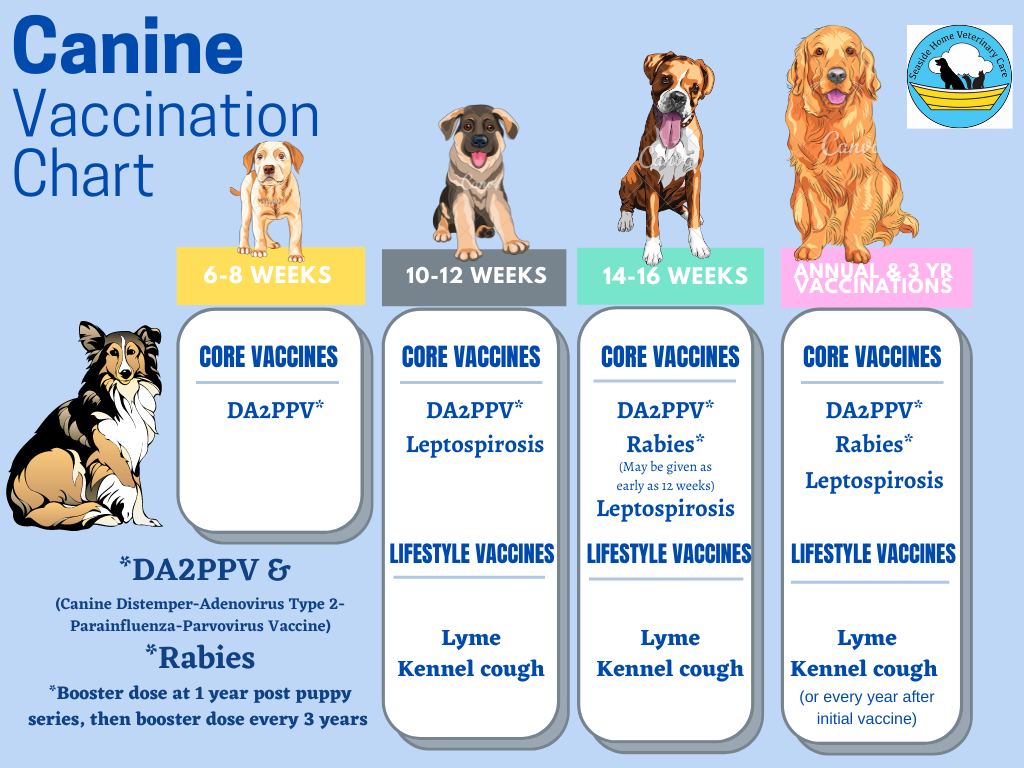Dog & Puppy Vaccination Information
Curious about some steps you can take to protect your pet and promote a healthy life? Read on!
Thank you for looking into getting your dog vaccinated, or brought up to date on their vaccinations! Listed below you will find all the information you should need to know on getting your pup properly protected against diseases and viruses to which they may be susceptible!
Each appointment will consist of a house visit fee (price differs depending on your local area) and a consultation and physical examination fee. When having multiple visits for puppies or initial vaccination series, the consultation fee is discounted at the subsequent visits! The vaccination price is the same at each appointment. We also give a complimentary Interceptor Dewormer at the time of vaccination. We’ve included some information on microchipping, which is something we can also do in the comfort of your own home to help keep your pet safe!
Please don’t hesitate to contact us if any of this is unclear or you have any other questions!
(You will also be given a free 6-week Pet Insurance trial at your puppy’s first visit!)
As we are a house call service, so we come right into your home! This does, of course, mean that we do not perform surgeries. However, we work with all of the clinics in the city and can provide them with the records of your vaccinations, etc., if you would like to have this portion of your pet care done in the comfort of your own home :)
The following is some more detailed information on everything above!
Microchipping
Microchipping is the insertion of a small (about the size of a grain of rice!) data device under the skin of your pet to allow their information to be accessed should they go missing. Vet clinics and animal shelters everywhere have scanners to use if an animal turns up, and when they scan your pet a unique ID number comes up which is connected to your information. This makes it possible for you to be contacted and reunited with your lost pet! Insertion of the chip is almost always well tolerated, and we have tried to help with this even more by carrying the 24 Pet Watch mini Microchips, which are even smaller! For more information you can check out: https://www.24petwatch.com/Canada/
Core Vaccines for Dogs
Rabies
This is a fatal viral disease that can infect all warm-blooded animals, including cats, dogs and humans. It affects the central nervous system, and often first reveals itself through significant changes in a dog’s behaviour, including sudden restlessness, aggression and fear. Spread by the bite of wild animals. Rabies vaccination is INCREDIBLY effective at preventing contraction of the Rabies virus. Recommended for ALL DOGS.
DA2PPV (Distemper, Adenovirus type 1 and 2, Parainfluenza, Parvovirus)
Distemper: Canine distemper is a systemic, very contagious, potentially fatal viral disease. It causes fever, runny nose, cough, and vomiting, progressing to twitching muscles or seizures. Can be carried by wild animals such as foxes, skunks, and racoons.
Adenovirus 1&2: Canine Adenovirus Type 1 (CAV-1): This is responsible for the development of canine hepatitis, a contagious, potentially fatal disease that affects the liver and other body organs; CAV-2 causes canine infectious laryngotracheitis. Young dogs, less than one year of age, are particularly susceptible. Symptoms of CAV-1 infection include fever, anorexia, lethargy, “hepatitis blue eye”, vomiting, diarrhea and possibly neurological disorders.
Canine Parainfluenza: causes contagious respiratory disease and is involved in opportunistic canine infections. Together with several other viruses and bacteria, CPiV is one component of infectious canine tracheobronchitis, also known as “kennel cough”. The main clinical sign is a dry, hacking cough.
Parvovirus: Parvoviral enteritis is an acute, potentially fatal disease of the immune system and gastrointestinal tract primarily, but the virus can cause further multisystemic disease. Although dogs of all ages are susceptible, puppies are more at risk. Symptoms include vomiting, bloody diarrhea, fever and dehydration. Since these symptoms can indicate other diseases as well, the veterinarian will confirm a diagnosis of parvoviral infection by doing a thorough work-up including diagnostic blood work. Parvovirus is extremely serious in puppies and can lead to severe dehydration, multi-organ failure, and death. Vaccination is EXTREMELY protective from a serious parvovirus infection in puppies. DA2PPV is recommended for ALL DOGS.
Leptospirosis
A contagious bacterial infection caused by organisms that can survive in stagnant surface water for extended periods. Animals and humans can become infected by ingesting contaminated feed or water. Symptoms include weakness, anorexia, vomiting, diarrhea, fever, lethargy and mild conjunctivitis in the early stage. Later stages of the disease are characterized by labored breathing, increased thirst and urination, back pain, reluctance to move and jaundice. Kidney and liver failure are the often fatal consequences of this disease. This disease often appears in sporadic pockets, with many dogs becoming infected when the disease establishes itself in a particular area. It is also contagious to humans (zoonotic) and is spread through the urine of an infected animal.
Lifestyle Vaccines for Dogs
1. Bordetella: also known as “kennel cough”. A commonly encountered bacterial pathogen in the disease complex that often leads to clinical signs of respiratory disease in dogs. This vaccine is often required at kennels and groomers, and is highly recommended for dogs that socialize regularly with other dogs.
2. Lyme disease: also known as Borreliosis, is caused by the Borrelia burgdorferi bacteria, and is transmitted by the black-legged tick (deer tick). The disease can affect both animals and humans. Symptoms include fever, which may become chronic, along with other signs such as loss of appetite, lethargy and swollen lymph nodes. Abnormal neurological, cardiac, kidney, and reproductive symptoms can also occur. Lyme disease left untreated can spread to the urologic (urinary) system, and is often fatal without aggressive treatment in these cases.
Vaccination Schedule for new puppies!
Puppies ideally receive vaccinations every 3-4 weeks (beginning around 6 weeks of age) until they are 14-16 weeks of age. If your puppy does not begin their series until 12 weeks of age, they will only need to have two appointments for vaccination, but will be unprotected and possibly very vulnerable to infection before this time.
SEE CHART ABOVE FOR PUPPY SCHEDULE
If Vaccinations are given on appropriate schedule:
DA2PPV will need to be given one year after the final booster, then every three years to remain effective.
Rabies will need to be given one year after the first shot, then every three years to remain effective. *It is important to note that your animal must be vaccinated for rabies within the 3 year limit, as any time after the exact date is no longer considered up to date.*
Lyme will need to be given a year after the final booster and given yearly to remain effective.
Leptospirosis will need to be given a year after the final booster and given yearly to remain effective.
Bordetella will need to be given a year after the first vaccination, and continue yearly. For dogs with high exposure (ie: going to doggie daycare regularly), revaccination is recommended every 6 months.
Vaccination for adult dogs
Adult dog vaccination schedules are slightly different from a new puppy. Your dog would fall into one of three categories.
1. Your dog has been kept up to date and you are merely doing their yearly boosters
2. Your dog has had vaccinations before, but they are now overdue
3. Your dog has never been vaccinated
The following examples are for categories 2 and 3
Category 2:
Schedule breakdown for a dog over 16 weeks of age who has been vaccinated, but is overdue AND who boards, or goes to doggy daycare where they interact with other dogs. They will need two appointments:
First appointment for a dog:
1 House visit fee: ($ fee depending on your location)
1 Physical exam and consultation fee
4 Vaccines (Rabies, DA2PPV, Leptospirosis and Bordetella)
Second appointment:
1 House visit fee: ($ fee depending on your location)
1 Recheck Physical exam and consultation fee (reduced fee for subsequent vaccination visit)
1 Vaccine (Leptospirosis)
Category 3
Schedule breakdown for a dog over 16 weeks of age who has never been vaccinated before – AND who is active outside. They will need two appointments:
First appointment for a dog:
1 House visit fee: ($ fee depending on your location)
1 Physical exam and consultation fee
4 Vaccines (Rabies, DA2PPV, Leptospirosis and Lyme)
Second appointment:
1 House visit fee: ($ fee depending on your location)
1 Recheck Physical exam and consultation fee (reduced fee for subsequent vaccination visit).
3 Booster vaccines (DA2PPV, Leptospirosis and Lyme )

